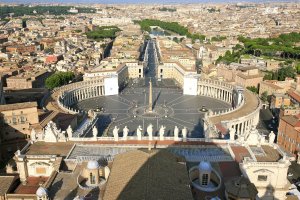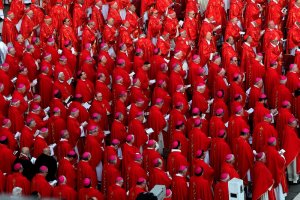Pope Francis has urged the Catholic Church to think about new ways of
evangelizing to counter the growing secularization of the West,
describing the effort as the Church’s “first and most important duty.”

In a December 21 Christmas message to Vatican officials in the Roman Curia, an administrative unit that assists the Pope in governing the Catholic Church, the pontiff called for a new mindset to cope with a rapidly changing world in which “cultural change, and institutional and personal change” are no longer compartmentalized but “intrinsically connected, in synergy.”
Although the Catholic Church has historically prized tradition over modernity, the 83-year-old pontiff reminded Vatican leaders that their 2,000-year-old institution is hardly a stranger to change. “The history of the people of God—the history of the Church—has always been marked by departures, movements and change,” he said.
The Pope referred to evangelization as an example of one of the changes he has introduced. The Pope is in the process of creating a “super dicastery” (a department of the Roman Curia) for evangelization—an autonomous mega-division of the Vatican whose importance will potentially be greater than the Congregation for the Doctrine of the Faith, also known as "The Supreme Congregation.”
Rooted in the Roman Inquisition, the doctrinal office, which insiders refer to as the Holy Office, will be responsible for promoting and defending Catholic doctrine as well as protecting the Church from heresy.
The so-called Dicastery for the Evangelization of Peoples will be the result of a revised constitution that has been in the works for more than six years. The division will be formed by merging two existing Vatican bodies—the Congregation for the Evangelization of Peoples, which oversees missionary territories, and the Pontifical Council for the Promotion of the New Evangelization, which Pope Francis's predecessor, Pope emeritus Benedict XVI, launched in 2010 to counter rapid secularization in Western countries.
In addition to making the Dicastery for the Evangelization of Peoples the Vatican's most vital organ, Pope Francis has taken control of other departments and required them to adapt to demographic changes within the Church as well as to the role of emerging technologies in missionary and evangelical work.
“Christendom no longer exists,” the Pope remarked in his speech, underscoring a truth relevant not only to Christianity, and Catholicism in particular, but arguably to all religions. "Today we are no longer the only ones who create culture, nor are we in the forefront of those most listened to. We are no longer living in a Christian world, because faith—especially in Europe, but also in a large part of the West—is no longer an evident presupposition of social life; indeed, faith is often rejected, derided, marginalized and ridiculed.” Therefore, he added: “We need other maps, other paradigms that might help us change our ways of thinking.”
Unlike his predecessors, Pope Francis lays relatively less emphasis on traditional Catholic teachings as a bulwark against the trend toward liberalization both within the Church and in wider society. Instead, he prefers to focus on social causes, including economic inequality, immigrants' rights and efforts to combat climate change.
The Pope stressed the vital importance of safeguarding the fundamental rights of immigrants and refugees, who, he said, represent the world's marginalized groups who have been “discarded from global society,” a collective “voice crying in the wilderness of our humanity.”
In past annual Christmas greetings, the Pope has sometimes used the occasion to criticize Vatican officials over such issues as their tendency to gossip or resist reform. This year, the pontiff warned against the “attitude of rigidity,” which, he said, “arises from fear of change and ends up strewing the ground of the common goods with stakes and obstacles, turning it into a minefield of lack of communication and hatred.”
He added: “Let's remember always that behind every rigidity lies some derangement.”


